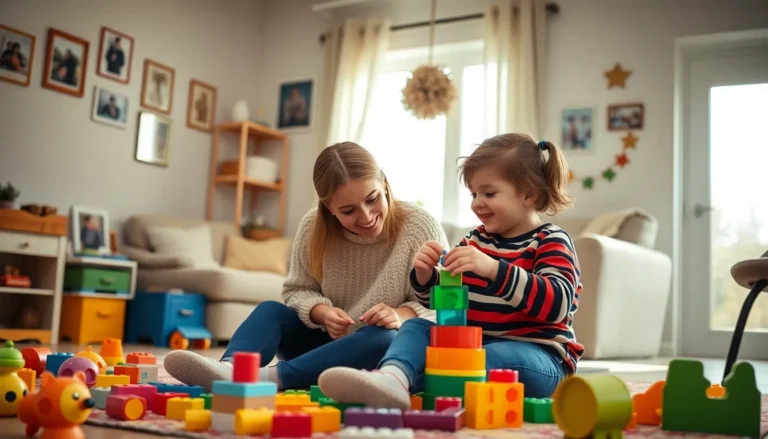Table of Contents
ToggleFoster children often find themselves in a world that feels a bit like a rollercoaster ride—full of ups, downs, and unexpected twists. They’re not just kids waiting for a forever home; they’re resilient little warriors navigating life’s challenges with a strength that would put superheroes to shame. Each story is a unique blend of hope, struggle, and the quest for belonging.
While it might seem daunting to consider the foster care system, it’s also a realm bursting with opportunities for connection and growth. These children have dreams, talents, and a whole lot of love to give. By shining a light on their experiences, we can foster understanding and inspire action. Let’s dive into the heart of what it means to support and uplift these incredible young souls, because every child deserves a chance to thrive.
Understanding Foster Care
Foster care provides a temporary home for children unable to live with their biological families. Many factors lead to this situation, including abuse, neglect, or parental difficulties. Each child’s experience in foster care is unique, shaped by their background and the circumstances that brought them to care.
Foster families play a crucial role in a child’s life, offering support and stability. Their nurturing can help foster children develop a sense of belonging and emotional security. Structured environments and care from foster parents foster growth and healing for these children.
The journey through foster care can be challenging. Children may face feelings of loss, abandonment, or confusion. Coping with these emotions often requires patience and understanding from foster families. Resources and therapy can assist children in processing their experiences and building resilience.
Foster care systems vary significantly across regions. In some areas, there is a strong focus on reuniting children with their biological families. Other systems prioritize finding permanent homes through adoption. The lack of consistent policies can affect the outcomes for foster children, making effective support critical.
Support networks for foster children exist within communities. Organizations provide resources for foster families and children, helping them navigate challenges. Engaging with local resources enhances the overall experience for children and fosters a sense of community.
Understanding foster care means recognizing the potential for growth within a structured environment. These children embody remarkable resilience, showcasing their ability to thrive despite adversity. Every foster child’s story has the potential to inspire and call for action to improve their futures.
The Experience of Foster Children

Foster children face distinct emotional and educational challenges that shape their lives. Understanding these aspects helps recognize their resilience.
Emotional Challenges
Foster children often experience feelings of loss and abandonment. Many struggle with uncertainty over their future and missed connections with biological families. Attachment issues may arise due to multiple placements, leaving them hesitant to form new bonds. Some children encounter stigma, resulting in isolation among peers. Mental health support is essential to navigate these emotional hurdles. Access to therapy improves coping strategies and builds resilience. A trusting relationship with foster families significantly aids emotional stability and security.
Educational Obstacles
Foster children frequently encounter educational disruptions. Frequent school changes can hinder academic performance and social integration. Many face gaps in education stemming from instability in their living situations. Lack of resources and support may contribute to disengagement from school. Special education services often remain underutilized, preventing foster children from receiving necessary help. Community programs that offer tutoring and mentorship can bridge these gaps and enhance educational outcomes. Stability in their academic environment fosters better learning experiences and personal growth.
The Role of Foster Parents
Foster parents play a vital role in the lives of foster children, providing stability, support, and love during challenging times. Their involvement directly affects a child’s ability to thrive in a secure environment.
Expectations and Responsibilities
Foster parents must ensure the safety and well-being of each child in their care. They support daily routines, including meals, homework, and extracurricular activities. Additionally, they need to maintain communication with biological families and child welfare agencies. Documentation of any issues or challenges helps track a child’s progress. Attending therapy sessions and advocating for educational needs are crucial responsibilities. Foster parents foster environments that encourage emotional and social development, allowing children to express themselves freely.
Building Relationships
Building strong relationships with foster children requires patience and understanding. Establishing trust is essential, and this may take time as children often arrive with trauma and uncertainty. Active listening and validating feelings aid in creating a safe space for open communication. Engaging in activities that interest the child can help cement these bonds. Additionally, recognizing milestones, no matter how small, promotes a sense of accomplishment. Celebrating successes together fosters a supportive atmosphere, encouraging children to open up and form deeper connections.
Support Systems for Foster Children
Support systems play a critical role in the lives of foster children, helping them navigate unique challenges. These systems provide essential resources and services that foster resilience and growth.
Community Resources
Community resources significantly enhance the well-being of foster children and their families. Various local organizations offer tutoring programs, mentorships, and social activities designed for these children. Many communities host support groups where foster parents can exchange experiences and gain insights. Additionally, recreational services create opportunities for foster children to engage with peers, fostering connections and reducing feelings of isolation. Access to these resources can vary, so understanding local offerings helps families make informed decisions about available support.
Mental Health Services
Mental health services are vital for addressing the emotional needs of foster children. Therapeutic options, including counseling and support groups, provide essential support in managing feelings of loss, abandonment, and uncertainty. Programs focusing on trauma-informed care address the specific challenges many foster children face. Access to licensed mental health professionals ensures that children receive appropriate interventions. By prioritizing mental health services, foster systems can build resilience and equip children with coping strategies that promote future success.
Foster children represent a unique blend of resilience and potential. Their journeys are marked by challenges but also by the possibility of growth and connection. The support from foster families and community resources plays a pivotal role in shaping their experiences. By understanding their needs and providing consistent emotional and educational support, society can help foster children thrive. It’s essential to advocate for better systems and resources that empower these children to realize their dreams. Every effort counts in creating a brighter future for those who deserve a chance at a fulfilling life.




